It’s no secret that art can be therapeutic. In fact, many people turn to painting, drawing, and sculpting as a way to work through their emotions. But what about abstract art? Can it also have a positive effect on mental health? According to a recent study, the answer is yes.
In a world that is constantly moving and changing, it’s important to find moments of stillness. For some, this may mean finding a quiet place to sit and relax. For others, it may mean looking at an abstract painting and letting the mind wander.
Recent studies have shown a strong correlation between abstract art and mental health. It seems that when people are allowed to explore their creativity, they experience improved mental clarity and peace. This makes sense, as creativity is often born from chaos.
Abstract art provides a way for people to explore their innermost thoughts and feelings without judgment or fear of reprisal.
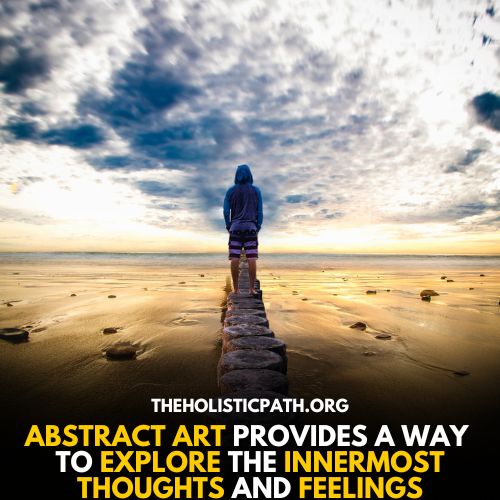
What Is Abstract Art And How Is It Different From Traditional Art Forms
Abstract art is often thought of as art that doesn’t “look like anything.” It can be abstractions of real-life objects, or completely non-representational. Some people think abstract art is easy to make because you can just put random colors and shapes together and call it abstract art.
But there is actually a lot of thought and planning that goes into making a good abstract painting.
Abstract art and mental health have a very strong connection. It can be very engaging and stimulating for the mind. It can also be very relaxing and soothing. Looking at abstract art can help to reduce stress levels and anxiety. For people who suffer from mental health conditions such as depression and OCD, abstract art can be very therapeutic.
Abstract art is different from traditional art forms in that it is not meant to represent reality. Traditional art forms such as realism and naturalism are based on the physical world, whereas abstract art is based on the artist’s inner world.
Abstract art is about exploring color, form, line, texture, pattern, and composition. It is about communicating emotions and ideas, rather than representing reality.
The History Of Abstract Art And Its Connection To Mental Health
Abstract art has long been associated with mental health, dating back to the early 20th century. When artists began experimenting with abstraction as a way to express their innermost thoughts and feelings.
For many artists, abstract art was a form of cathartic release, a way to channel their emotions into something tangible.
While abstract art was once seen as the preserve of the mentally ill, it is now recognized as a legitimate and powerful form of expression. Today, abstract art is used in therapeutic settings to help people explore the feelings and emotions.
It can be an effective way to manage stress and anxiety, and it can also help to boost self-esteem and confidence. Abstract art provides a creative outlet for self-expression, and it can be a valuable tool for promoting mental well-being.
How Can People With Mental Health Issues Benefit From Abstract Art
It’s no secret that art can be therapeutic. For centuries, people have used art as a way to express themselves and explore their emotions. But what about abstract art? Can it really have a positive impact on mental health?
Some experts believe that abstract art can be especially beneficial for people with mental health issues. This type of art encourages self-expression and creativity, while also helping to promote relaxation.
The abstract nature of the artwork can also provide a sense of order and structure for those who are struggling with chaotic thoughts. In addition, the bright colors and patterns often found in abstract art can help to lift moods and create a sense of calm.
If you’re struggling with mental health issues, it may be worth giving abstract art a try. Who knows, you might just find yourself feeling more balanced and relaxed after a few sessions.
10 Ways Abstract Art Affect Mental Health
Abstract art can have a profound effect on our mental health. Here are 10 ways that abstract art can help improve our mental health:
1. Abstract Art Can Help To Reduce Stress Levels:
Abstract art can be a powerful tool for reducing stress levels. When we look at abstract art, we are not trying to decipher a meaning or message. This can help to relax our minds and reduce stress levels.
The act of creating abstract art can be therapeutic in itself, providing a healthy outlet for emotions and helping to boost your mood. Numerous studies have shown that art therapy can be effective in treating anxiety and depression.
So next time you’re feeling overwhelmed, try spending some time working on an abstract painting or sculpture. Who knows, you might just find yourself feeling calmer and more relaxed afterward.
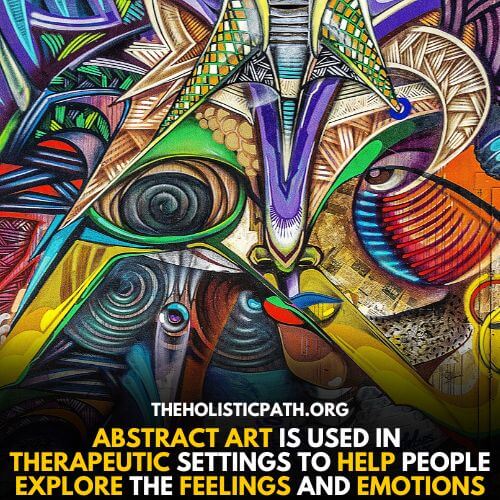
2. Abstract Art Can Help To Boost Our Mood:
Abstract art can have a powerful effect on our mood. By its very nature, abstract art is open to interpretation, which means that it can speak to us on a personal level.
Looking at abstract art can help us to access our feelings and emotions, and to process them in a healthy way.
Additionally, the bright colors and bold patterns often used in abstract art can help to boost our mood and create a sense of joy and happiness. In a world that is often chaotic and unpredictable, abstract art can provide a much-needed sense of calm and peace.
3. Abstract Art Can Help To Increase Creativity:
Abstract has no strict guidelines or dos and don’ts. This enables out-of-the-box thinking. This can lead to increased creativity in other areas of life. Abstract art is often seen as elitist or inaccessible, but it can actually be a helpful tool for increasing creativity.
By its very nature, abstract art forces viewers to engage with the work on a more personal level. There is no right or wrong interpretation. This encourages people to look at the world in new and innovative ways. What one person sees as a collection of random shapes, another may see as a landscape or a portrait.
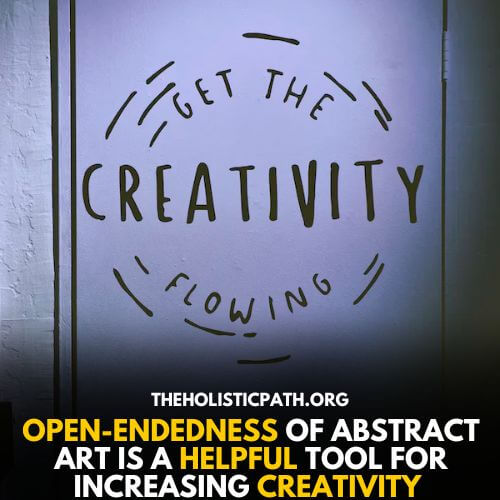
This open-endedness can help to break down mental barriers and make it easier to come up with new ideas. Abstract art can also be a form of self-expression, providing an outlet for emotions that might otherwise remain bottled up.
In this way, it can serve as a valuable tool for mental health and well-being. Whether you’re an experienced artist or someone who’s never picked up a paintbrush, abstract art can help to increase creativity and encourage new ways of thinking.
4. Abstract Art Can Help To Improve Focus And Concentration:
Abstract art has often been praised for its ability to improve focus and concentration. While this may seem like a stretch, there is actually some science to back it up.
A study from the University of Leicester found that looking at abstract art can help to increase cognitive flexibility, which is the ability to switch between tasks quickly and easily. In other words, abstract art may help you to be more productive when working on complex projects.
Furthermore, a study from the University of Westminster found that abstract art can also help to reduce stress levels. So, if you’re feeling overwhelmed, taking a few minutes to appreciate some abstract art could help you to refocus and de-stress.
5. Abstract Art Can Help To Promote Relaxation:
Abstract art can be a powerful tool for promoting relaxation. By its very nature, abstract art is open to interpretation, which can help to still the mind and promote feelings of calm.
In addition, the abstract forms and colors used in many abstract paintings can help to soothe the senses and create a sense of space and peace. For those struggling with anxiety or stress, viewing abstract art can be an effective way to promote relaxation and well-being.
Moreover, abstract art can be enjoyed in a variety of settings, making it an accessible form of relaxation for people of all ages and backgrounds.
6. Abstract Art Can Help To Increase Self-Awareness:
By looking at abstract art, we can become more aware of our own thoughts and feelings. This can lead to greater self-awareness overall.
Abstract art can help to increase self-awareness. By abstracting reality, we are forced to confront our own perceptions and assumptions. This process can help us to question our beliefs and think about things in new ways.
Additionally, abstract art can provide a space for self-exploration and discovery. We may encounter aspects of ourselves that we were not previously aware of. For example, we may find that we have a deep interest in color theory or composition.
Abstract art can help us to better understand ourselves and the world around us.
7. Abstract Art Can Help To Reduce Anxiety Levels.
It’s no secret that anxiety levels are on the rise. In fact, according to the Anxiety and Depression Association of America, anxiety disorders are the most common mental illness in the US, affecting 40 million adults.
That’s a lot of people struggling with overwhelming worry and stress on a daily basis. But there is hope. Research has shown that abstract art can help to reduce anxiety levels.
One study found that viewing abstract expressionist paintings led to a decrease in heart rate and feelings of anxiety. The theory is that abstract art can provide a sense of calm and relaxation because it doesn’t require viewers to process literal meaning. Instead, they can simply appreciate the colors, shapes, and textures.
So if you’re feeling anxious, consider spending some time with some abstract art. Head to your local museum or art gallery, or do a search online. You might just find that it helps to ease your worries.
8. Abstract Art Can Help To Promote Positive Thinking:
One of the benefits of abstract art is that it can help to promote positive thinking. When we look at abstract art, we are training our brains to see the beauty in chaos and randomness. This can lead to more positive thinking in general.
When we look at abstract art, we are not looking at a realistic representation of the world around us. This can be freeing, and allow us to see things in a new way. For people who are struggling with mental health issues, this can be especially helpful.
Abstract art can provide a different perspective that can be therapeutic and promote healing.
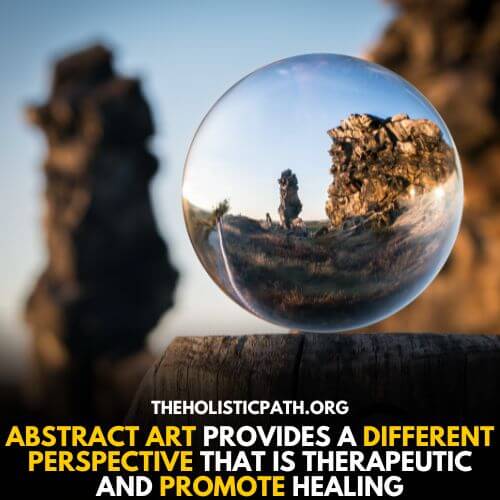
The process of creating abstract art can also be a form of self-care. It can be a way to express emotions and release stress. When we engage in positive activities like this, it can help to improve our mood and overall sense of well-being.
9. Abstract Art Can Help To Increase Emotional Intelligence:
Abstract art can be confusing. But did you know that it can also help to improve your emotional intelligence? A new study has found that viewing abstract art can help to increase levels of empathy and self-awareness.
The research, which was conducted at the University of En Hyundai, involved showing a group of participants abstract artworks while measuring their brain activity. The results showed that those who viewed abstract art had increased activity in the areas of the brain associated with empathy and self-awareness.
So next time you’re feeling down, try looking at some abstract art. It just might help to boost your emotional intelligence!
By looking at abstract art, we learn to read nonverbal cues and understand the emotions of others better. This can lead to increased emotional intelligence overall.
10. Abstract Art Can Help To Connect Us With Others:
When we share our abstract artwork with others, we are opening up a channel of communication that goes beyond words. This connection with others can be beneficial for our mental health.
For example, abstract art can be used as a tool for expression, allowing us to share our innermost thoughts and feelings with others. In addition, abstract art can be used as a means of communication, helping us to connect with others who may not share our language or culture.
Abstract art can also be used as a form of therapy, providing a creative outlet for those who are dealing with mental health issues.
Abstract art can help to bridge the gap between ourselves and others, providing a unique and powerful way to connect with the world around us.
What Are The Benefits Of Using Abstract Art In Therapy
Abstract art has been shown to have a plethora of mental health benefits. From providing a creative outlet to reducing stress levels, abstract art can be extremely beneficial. Here are 20 benefits of using abstract art in therapy:
- Abstract art can help to reduce stress and anxiety levels.
- It can provide a creative outlet for emotions and feelings that are difficult to express in words.
- It can help to increase self-esteem and confidence.
- It can promote relaxation and allow the mind to focus on the present moment.
- It can help to boost mood and energy levels.
- It can promote cognitive stimulation and creativity.
- It can provide an opportunity for self-reflection and introspection.
- It can help to release repressed emotions and feelings.
- It can help to work through traumas and past events.
- It can foster a sense of connection and belongingness.
- It can promote emotional regulation and coping skills development.
- It can offer a sense of achievement and accomplishment.
- Abstract art appreciation can enhance the quality of life.
- It has been shown to improve brain function.
- It helps seniors maintain their cognitive abilities.
- It eases communication between different parts of the brain.
- It teaches problem-solving skills.
- It encourages exploration.
- It develops motor skills.
- It strengthens eye-hand coordination.
Can Abstract Art Be Used To Treat Mental Health Conditions
Abstract art has long been used as a form of self-expression, and recent studies have shown that it can also be an effective treatment for mental health conditions. One of the most common conditions that abstract art can help to treat is anxiety.
By focusing on the creative process, abstract art can help to distract from negative thoughts and ease anxiety symptoms. Also, the abstract nature of the artwork can help to foster a sense of calm and promote relaxation.

Art therapy is also often used to treat depression, as it can help to boost mood and encourage positive thinking. The bright colors and geometric shapes often found in abstract art can help to stimulate the mind and create a sense of joy.
Abstract art can also be used to treat more serious mental health conditions, such as post-traumatic stress disorder. The act of creating abstract art can help to process trauma and release emotions in a safe and controlled environment.
Abstract art can be a powerful tool for managing mental health conditions.
What Are Some Tips For Improving Your Mental Health Through Art
Abstract art is often seen as a form of mental healthcare. As it can provide an outlet for emotions and help to improve cognitive function. Here are 15 tips for how you can use abstract art to improve your mental health:
- Get in touch with your feelings: Abstract art can be a great way to explore and express your emotions. It can be helpful to talk to a therapist or counselor about your abstract paintings, as they can offer guidance and support.
- Use abstract art as a form of self-care: Spend some time each week creating abstract art, and use it as a way to relax and unwind. This can be a great way to de-stress after a long day.
- Be patient: It can take time to get used to expressing yourself through abstract art. Don’t be discouraged if your early efforts don’t look the way you want them to – it takes practice!
- Experiment: There are no rules when it comes to abstract art. Play around with different techniques and mediums until you find something that feels right for you.
- Let go of perfectionism: Abstract art is all about experimentation and self-expression, so don’t worry if your paintings are “perfect” or not. The most important thing is that you enjoy the process of creating them.
- Take inspiration from nature: Not sure where to start? Looking at nature can be a great way to get inspired for your abstract paintings. Just let your imagination run wild!
- Use color to express yourself: Color has the power to evoke certain emotions, so think about how you want to feel when looking at your painting. Do you want it to be calming or energizing? Bright or subdued? The choice is yours!
- Create a personal connection: When working on an abstract painting, think about someone or something that is important to you. This could be a loved one, a pet, or even a special place. Connecting your painting with something personal will mean even more to you once it’s finished.
- Let the painting evolve: An abstract painting is never really “done” – you can always add more paint, make changes, or experiment with new techniques. Embrace the fluidity of the medium and see where your painting takes you!
- Give yourself time: Don’t rush your abstract painting – take the time you need to explore and experiment and trust that the final result will be worth the wait. After all, this is supposed to be fun!
- Set aside distractions: When working on an abstract painting, it’s important to focus on the task at hand and tune out any distractions. Turn off your phone, close the door, and give yourself some uninterrupted time to create.
- Work in sessions: If you find it difficult to set aside large chunks of time for painting, try working in shorter sessions instead. You could paint for 30 minutes in the morning before starting your day, or spend an hour in the evening after dinner. Once you get into a rhythm, it will be easier to carve out larger blocks of time for painting.
- Join a class or group: Painting with others can help increase motivation and accountability, not to mention it’s just plain fun! If there aren’t any classes available near you, try looking online for virtual options.
- Take care of yourself first: In order for your abstract paintings (and mental health) to thrive, it’s important that you take care of yourself first. Make sure you’re getting enough sleep, eating healthy meals, and spending time outdoors (weather permitting); all of these things will help improve your creativity and focus.
- Trust your instincts: At the end of the day, there are no “right” or “wrong” ways to create abstract art – only what works best for YOU. So trust your intuition and go with whatever feels natural. Who knows where your creativity will take you!
How Can You Get Started With Creating Your Own Abstract Artwork
Abstract art can be a great way to express your emotions and thoughts, especially if you’re going through a tough time. It can be an outlet to release all the negative energy you’re carrying around. Abstract art is also a great way of exploring your creativity.
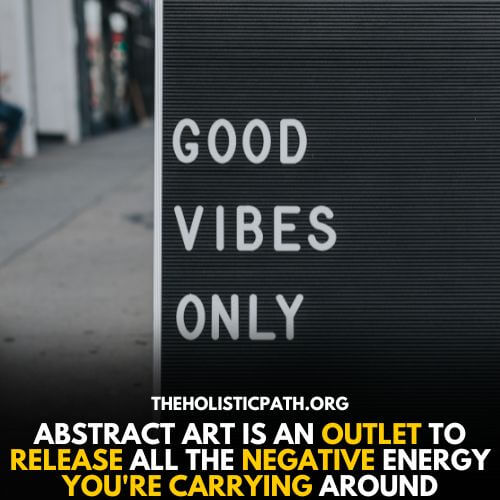
And it doesn’t have to be complicated or expensive – all you need is some paper and some paint!
There are no rules when it comes to abstract art, so don’t feel like you have to stick to traditional norms. Let your imagination run wild! Experiment with different colors, shapes, and textures. The possibilities are endless. And don’t worry if your abstract artwork doesn’t look “perfect.”
Remember, there are no mistakes in abstract art – only happy accidents!
So what are you waiting for? Get started on your abstract artwork today!
Are There Any Risks Associated With Using Abstract Art As A Form Of Therapy
Abstract art has been shown to be a great form of therapy for those with mental health disorders such as anxiety and depression. Abstract art can help people to express themselves in a way that they may not be able to do with traditional forms of art.
Abstract art can also help people to relax and to de-stress. However, there are some risks associated with using abstract art as a form of therapy. These risks include:
- The therapist may not be trained in how to use abstract art as a form of therapy properly.
- Abstract art may trigger negative emotions or memories.
- Abstract art may not be effective for all types of mental health disorders. If you are considering using abstract art as a form of therapy, it is important to speak with your therapist about the potential risks and benefits.
Conclusion
It’s clear that abstract art can have a positive impact on mental health. Abstract art offers an outlet for self-expression and can help to reduce stress and promote relaxation. What’s more, the creative process of making abstract art can boost self-esteem and confidence.
While abstract art may not be everyone’s cup of tea, there’s no denying that it can have some real benefits for mental health.
